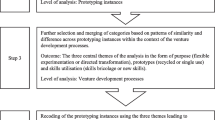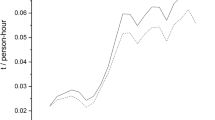Abstract
In this paper, we observe an undergoing transformation in the qualification of the processes of emergence that we call ‘innovation’. First conceived in the industrial mode defined by Schumpeter within the consumer economy context, innovation has now acquired a more general meaning and has been transformed in the understanding of collective action. Against the backdrop of transformations in the industrial reality, the crisis of desire in consumer societies, and the impoverishment of the imaginary, ‘social innovation’ appears to be a new form of imaginary institution of society in the definition that Cornelius Castoriadis gave to this expression. The semantic enrichment of the notion of innovation allows us to glimpse a new framework for the ethics of innovation, which needs to be interpreted from the perspective of the age of transitions.
Similar content being viewed by others
Data Availability
Yes.
References
Alexandra, A. (1989). “All men agree on this” Hobbes on the fear of death and the way to peace. History of Philosophy Quarterly, 6(1), 37–55. http://www.jstor.org/stable/27743879.
Bachelard, G. (1975). On poetic imagination and reverie. Selections from the works of Gaston Bachelard. Translated, with an introd. by Colette Gaudin. Indianapolis: Bobbs-Merrill.
Bason, C. (Ed.). (2014). Design for policy. Routledge.
Beck, U. (1992). Risk society. Towards a new modernity. Sage.
Bourban, M., & Rochel, J. (2021). Synergies in innovation : Lessons learnt from innovation ethics for responsible innovation. Philos. Technol, 34, 373–394. https://doi.org/10.1007/s13347-020-00392-w)
Burbidge, J. (1981). Man, God, and death in Hegel’s phenomenology. Philosophy and Phenomenological Research, 42(2), 183–196. https://doi.org/10.2307/2107290
Castoriadis, C. (1987). The imaginary institution of society. Translated by K. Blamey. Cambridge (UK): Polity Press.
Condorcet, M. J. A. N. C., O’Connor, A. C., & Arago, M. F. (1847). Sur l’instruction publique (1791–19922), in Oeuvres de Condorcet. VII. F. Frommann, G. Holzboog.
Curley, E. (1985). The complete works of Spinoza (Vol. 1). Princeton University Press.
Duge, C. (1971). Condorcet on education. British Journal of Educational Studies, 19(3), 272–282. https://doi.org/10.1080/00071005.1971.9973320
Dunne, A., & Raby, F. (2013). Speculative everything. Design, fiction, and social dreaming, Cambridge (MA): The MIT Press.
Esslinger, H. H. (2011). Sustainable design: Beyond the innovation-driven business model. Journal of Product Innovation Management, 28(3), 401–404.
Fixson, S. K., & Read, J. M. (2012). Creating innovation leaders: Why we need to blend business and design education. Design Management Review, 23(4), 4–12. https://doi.org/10.1111/j.1948-7169.2012.00207.x
Friederich, S., & Boudry, M. (2022). Ethics of nuclear energy in times of climate change: Escaping the collective action problem. Philos Technol, 35, 30. https://doi.org/10.1007/s13347-022-00527-1
Gangas, S. (2014). From alienation to capability deprivation: Reconstructing a sociological concept. Social Science Information, 53(1), 54–75. https://doi.org/10.1177/0539018413509910
Gardiner, S. M. (2011). A perfect moral storm: The ethical tragedy of climate change. Oxford University Press.
Godin, B. (2015). Innovation contested: The idea of innovation over the centuries (Vol. 98). Routledge.
Grimaldi, N. (1983). L’Art ou la feinte passion. Essai sur l’expérience esthétique, Paris: P.U.F.
Hamilton, N. (Ed.). (1980). Design and industry: The effects of industrialisation and technical change on design. Design Council.
Hegel, G.W.F. (2018). The phenomenology of spirit, ed. and trans. T. Pinkard, Cambridge: Cambridge University Press.
Hobbes, T. (2012), Leviathan, N. Malcolm (ed.), Oxford: Clarendon Press.
Illouz, E. (2007). Cold intimacies: The making of emotional capitalism. Polity Press.
Innerarity, D. (2010). The transformation of politics: Governing in the age of complex societies. Translated by S. Williams and S. Champeau. Bruxelles, New York: P.I.E. Peter Lang, 2010.
Jonas, H. (1984). The imperative of responsibility. In search for an ethics for the technological age. The University of Chicago Press.
Kahn, C. H. (1987). Plato’s theory of desire. The review of metaphysics, 41(1), 77–103. http://www.jstor.org/stable/20128559
Kalekin-Fishman, D., & Langman, L. (2015). Alienation: The critique that refuses to disappear. Current Sociology, 63(6), 916–933. https://doi.org/10.1177/0011392115591612
Klotz, M. (2006). Alienation, labor, and sexuality in Marx’s 1844 manuscripts. Rethinking Marxism, 18(3), 405–413. https://doi.org/10.1080/08935690600748124
Lasch, C. (1979). The culture of narcissism: American life in an age of diminishing expectations. Warner Books.
Lin, M. (2004). Spinozas metaphysics of desire The demonstration of IIIP6. Archiv für Geschichte der Philosophie, 86(1), 21–55. https://doi.org/10.1515/agph.2004.003
MacPherson, C. B. (1962). The political theory of possessive individualism: Hobbes to Locke. Oxford University Press.
McCraw, T. K. (2007). Prophet of innovation: Joseph Schumpeter and creative destruction. Belknap Press of Harvard University Press.
Marx, K. (1964). Economic and philosophic manuscripts of 1844. Translation M. Milligan, ed. D. J. Struik. New York: International Publishers.
Mauss, M. (1954). The gift: Forms and functions of exchange in archaic societies. Glencoe (Ill.): Free press.
Ménissier, T. (2021). Innovations. Une enquête philosophique. Hermann.
Michaud, Y. (2012). Ibiza mon amour. Enquête sur l’industrialisation du plaisir, Paris: NiL Éditions.
Norman, D. (1988). The design of everyday things. Basic Books.
Osborne, T. (2017). Machiavelli and the liberalism of fear. History of the Human Sciences, 30(5), 68–85. https://doi.org/10.1177/0952695117723223
Plato (1986). Plato’s symposium. A translation by S. Benardete. Chicago, IL: University of Chicago Press.
Pocock, J. G. A. (1985). Virtue, commerce, and history : Essays on political thought and history, chiefly in the eighteenth century. Cambridge University Press.
Preston, C. J. (2018). The synthetic age: Outdesigning evolution, resurrecting species, and reengineering our world. The MIT Press.
Rothschild, E. (1996). Condorcet and the conflict of values. The Historical Journal, 39(3), 677–701. https://doi.org/10.1017/S0018246X00024493
Quer, M. (2020). Fear of death as the foundation of modern political philosophy and its overcoming by transhumanism. Postmodern Openings, 11(4), 323–333. https://doi.org/10.18662/po/11.4/238
Stilgoe, J., Owen, R., & Macnaghten, P. (2013). Developing a framework for responsible innovation. Research Policy, 42(9), 1568–1580. https://doi.org/10.1016/j.respol.2013.05.008
Schumpeter, J. A. (1928). The instability of capitalism. The Economic Journal, 38(151), 361–386. https://doi.org/10.2307/2224315
Schumpeter, J. A. (1934). The theory of economic development. Harvard University Press.
Schumpeter, J.A. (1994). Capitalism, socialism and democracy. London & New York: Routledge
Stiegler, B. (2014). Symbolic misery. Volume 1, The hyperindustrial epoch. Translated by Barnaby Norman. Cambridge: Polity Press.
Stiegler, B. (2015). Symbolic misery: Volume 2: The katastrophē of the sensible. Translated by Barnaby Norman. Cambridge (UK), Malden (MA): Polity Press.
Timmermans, J., & Blok, V. (2021). A critical hermeneutic reflection on the paradigm-level assumptions underlying responsible innovation. Synthese, 198(Suppl 19), S4635–S4666. https://doi.org/10.1007/s11229-018-1839-z
Vallas, S. P., & Yarrow, M. (1987). Advanced technology and worker alienation: Comments on the Blauner/Marxism debate. Work and Occupations, 14(1), 126–142. https://doi.org/10.1177/0730888487014001007
Vandemerwe, S., & Rada, J. (1988). Servitization of business: Adding value by adding services. European Management Journal., 6(4), 314–324. https://doi.org/10.1016/0263-2373(88)90033-3
von Schomberg, L., & Blok, V. (2021a). The turbulent age of innovation. Synthese, 198, 4667–4683. https://doi.org/10.1007/s11229-018-01950-8
von Schomberg, L., & Blok, V. (2021b). Technology in the age of innovation: Responsible innovation as a new subdomain within the philosophy of technology. Philos. Technol., 34, 309–323. https://doi.org/10.1007/s13347-019-00386-3
Wolff, J. (2003). Why read Marx today? Oxford University Press.
Ziegler, R. (2020). Innovation, ethics and our common futures : A collaborative philosophy. Edward Elgar.
Zmora, H. (2007). A world without a saving grace: Glory and immortality in Machiavelli. History of Political Thought, 28(3), 449–468. http://www.jstor.org/stable/26222653.
Acknowledgements
The author would like to thank his colleagues at Grenoble Alpes University, Fabienne Martin-Juchat, whose discussion advanced his ideas, and Louis Devillaine and Alice Leyraud for their contribution to the revision of the text.
Funding
Funding obtained from the Ethics & AI Chair, Multidisciplinary Institute in Artificial Intelligence (MIAI@Grenoble Alpes, ANR-19-P3IA-0003).
Author information
Authors and Affiliations
Contributions
TM wrote the manuscript. The author has read and approved the final manuscript.
Corresponding author
Ethics declarations
Ethics Approval and Consent to Participate
Yes.
Consent for Publication
Yes.
Competing Interests
The author declares no competing interests.
Additional information
Publisher's Note
Springer Nature remains neutral with regard to jurisdictional claims in published maps and institutional affiliations.
Rights and permissions
About this article
Cite this article
Ménissier, T. Innovation, from Industrial Consumption to the Reinvention of Socialization: a Reflection on a Recent Semantic Enrichment. Philos. Technol. 35, 66 (2022). https://doi.org/10.1007/s13347-022-00563-x
Received:
Accepted:
Published:
DOI: https://doi.org/10.1007/s13347-022-00563-x




